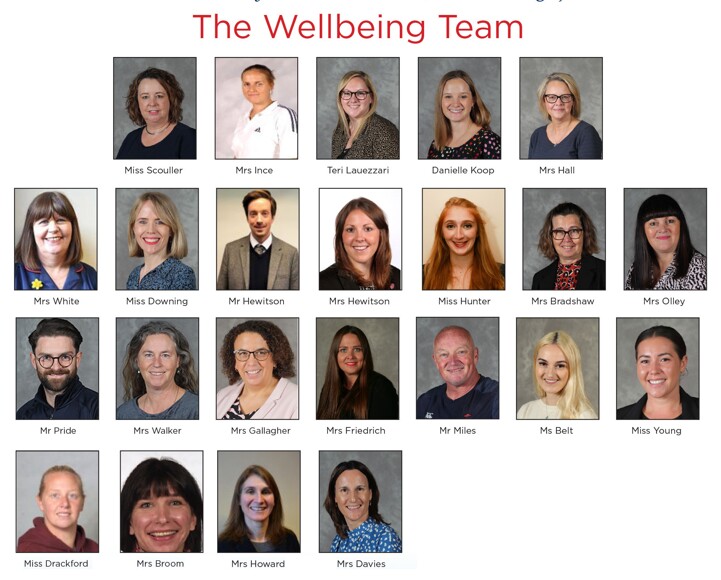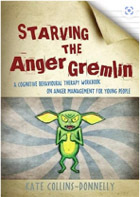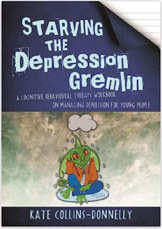Mental Health and Wellbeing
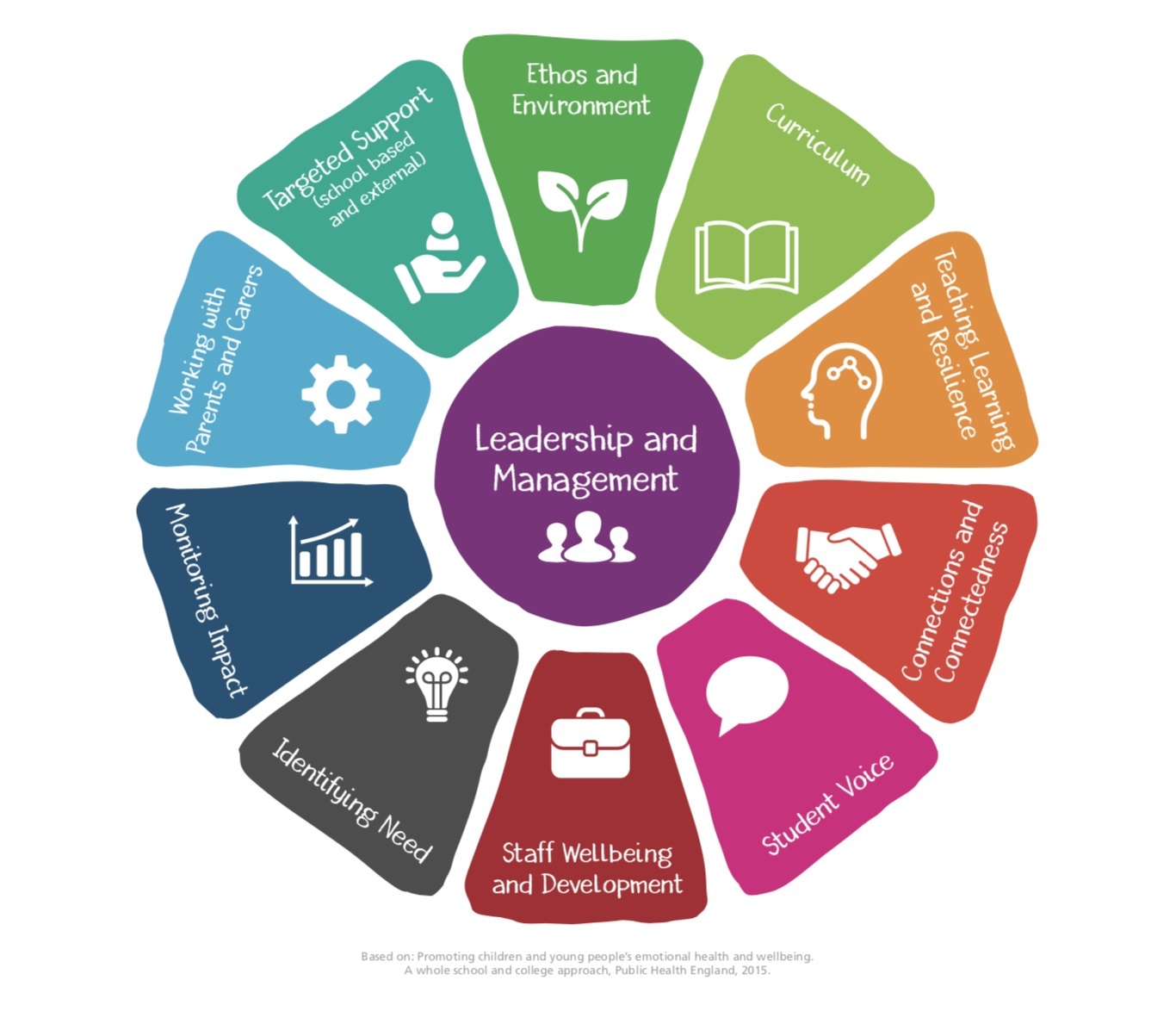
Growing up in the 21st century presents challenges to young people and at John Henry Newman we do all we can to support our students’ wellbeing.
We want our students to flourish at John Henry Newman in all aspects of their lives, intellectually, morally, socially and emotionally. The school takes the wellbeing of our students very seriously and, through our mission to be a living, Christian experience, we encourage a culture that upholds respect, compassion and understanding. We take a whole school approach to wellbeing that encourages students to build emotional resilience and helps them to understand the importance of looking after their own mental health, as they face the various challenges that modern life presents.
We understand that life is not always straightforward and so we also provide support that is tailored to each student, whenever the need arises. The first port of call for any concerns about wellbeing is the Form Tutor. Learning Coordinators can also be approached for help, and they can make a referral to our Wellbeing Team who will help to secure the most appropriate support. This support may include peer mentors, group work and regular contact. In addition, our school mentor and school counsellors provide a safe, confidential and non-judgemental space for students to talk about anything that may be worrying them. We also can refer to outside agencies and professionals that can help.
Signposting
CYPMHS Service Director September-24
Referral process
If a referral is required, the Mental Health Lead will meet the student for a 1:1 assessment to gain an understanding of the difficulties the student is facing and to discuss possible options for support. We take a systemic approach which means, wherever possible, involving all those adults responsible for the wellbeing of the student. There is a wide range of support available externally and we support parents in making referrals – a comprehensive list of providers can be found in the signposting section above. There is limited provision within school which may include ELSA support, group work, mentoring and counselling.
School support
ELSA support
An ELSA in a school is an Emotional Literacy Support Assistant. ELSAs are supervised by Educational Psychologists. They are trained to understand the barriers to learning that some children and young people might have and can help them with this. They can support the children and young person’s emotional development and help them cope with life’s challenges. ELSAs will also help children and young people to find solutions to problems they might have. An ELSA is not there to fix problems but to help them find their own solutions and offer that important support to a child or young person.
Group Work
Group work is offered to support students with social skills, low self-esteem and anxiety. Group work follows a 6-session programme of work facilitated by a member of the Wellbeing Team. We also run a 12-session programme of work from the Catholic Children’s Society (Spectrum) for students who have been bereaved.
Mentoring
Mentoring is focused on helping students to achieve specified and agreed goals. Students are offered 6 sessions of 45 minutes every week or fortnight. Mentoring can empower young people to make informed decisions for themselves by helping them to understand their difficulties. What young people discuss with the school mentor is kept confidential. However, if there are any concerns about a young person’s safety (or someone else’s), the school safeguarding policy is followed.
Counselling
A trained school counsellor gives a young person a place that is focused 100% on their needs – a safe space to help them to understand and cope with what they’re going through. Counselling can have a positive effect on young people’s confidence, resilience, sense of self-worth, family relationships, friendships, school attendance and academic achievement.
At SJHN, we offer 8-12 sessions of counselling which is reviewed at 6 weeks.
Meet the Team
 Sarah Ince - Mental Health Lead
Sarah Ince - Mental Health Lead
My name is Mrs Ince and I am the Mental Health Lead. I am part of the wellbeing Team in school. I may arrange to meet with you in school and find ways to support you, if you need a little bit of help to feel more able to cope. I work closely alongside your Form Tutors, Year team and your teachers to help you. I can help speak to your parents/guardians if it is required. I hope to be able to help you find support both inside and outside of school. 
When I'm not at work I enjoy spending time outside, walking or watching the football. To help me unwind, you can often find me with my Dog 'Pickle', she is always ready for a cuddle and to catch up on box set or two!
 Mrs Hall
Mrs Hall
My name is Mrs Hall - I'm the school's Wellbeing Support Assistant and you can find me in the Day Room, our Wellbeing space. I work closely with Mrs Ince and the school counsellors to support students in school.
When I'm not at work I enjoy listening to music, painting and spending time with family and friends.
 Danielle Koop
Danielle Koop
My name is Danielle, I am a qualified counsellor with experience working with young people and the neurodiverse. I hope to offer you a confidential space to just be who you are and to listen on a one-to-one basis. Providing you a safe space to explore whatever you wish to bring to the room. This can sound a little overwhelming, but our room is warm and friendly with lots of things to help you feel comfortable.
When I’m not working I like to be outside being close to nature, watching how things grow and flourish with a little support.
Fun facts - I can bake a pretty awesome cake.
 Teri Lauezzari
Teri Lauezzari
I am Teri, a qualified counsellor with child and adolescent qualifications and experience. I understand the counselling process can be a little overwhelming, so I'm here to offer a warm, friendly space for you to make sense of your world and what you're feeling, while still having fun. I provide regular confidential 1:1's, in a non- judgemental and criticism-free environment to share and explore whatever you wish to talk about
When I'm not working, I practice what I preach, filling my cup up with acts of self-care so I feel nourished, and able to give from my overflow.
Funfacts - I love Squashies and cats, and I can rap all of Macklemore's 'Can't Hold Us'.
What to do if you need support?
|
Deputy Headteacher (Pastoral & Life Skills) |
Mrs W Howard |
|
|
Assistant Headteacher (Safeguarding Lead) |
Miss J Scouller |
|
|
Mental Health Lead |
Mrs S Ince |
|
|
Year 7 |
Mr Medina |
|
|
Year 8 |
Miss Belt |
|
|
Year 9 |
Miss Springett |
|
|
Year 10 |
Mrs Gallagher |
|
|
Year 11 |
Miss Bullock |
|
|
Sixth Form Year 12 Year 13 |
Mrs R Davies Lauren Hunter Janine Crump |
EHWB Policy tbc
In the following section you will find information pages on some of the main issues affecting teenagers and young adults in secondary school. If you have any concerns about your child, please contact the Mental Health Lead by using this form
CRISIS
If you need help in a mental health crisis
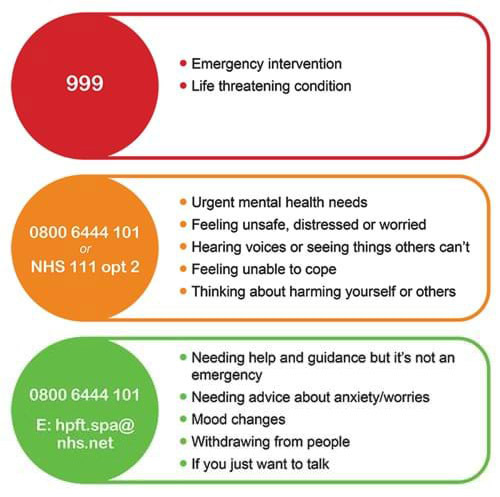
For more information click here
Hertfordshire
For urgent mental health help or if you need to urgently speak to someone
Call our Single Point of Access (SPA) Tel: 0800 6444 101 available 24/7.
Email: hpft.spa@nhs.net
Bedfordshire
Cambridgeshire
Services available immediately/anytime (24/7)
- If you're worried about a child’s health contact your GP or go to 111.nhs.uk (for people aged 5 and over only) or call NHS direct on 111
- If a child is in immediate danger or in a life-threatening emergency or they cannot keep themselves safe call 999 or go to A&E.
Call 116 123
A free, confidential, 24/7 non-judgemental support if you are feeling suicidal. You may also email: jo@samaritans.org www.samaritans.org

Text “YM” to 85258
A free, confidential, 24/7 crisis text message support service for young people experiencing a mental health crisis with suicidal thoughts, abuse or assault, self-harm, bullying or relationship issues. www.youngminds.org.uk
Young Minds also offer a Parent Helpline: 0808 802 5544 from Monday to Fridays 9.30am – 4pm for parents and carers worried about a child or young person under 25 or have any questions about a child’s behaviour, emotional wellbeing, mental health condition, or have questions about the treatment a child is receiving who’s already been admitted to NHSnChild Adolescent Mental Health Services (CAMHS). www.youngminds.org.uk/find-help/for-parents/parents-helpline/
Text ‘AFC’ to 85258
A free, confidential, 24/7 crisis text message support service for anyone (primary and secondary school pupils, parents/carers and school staff) who is feeling overwhelmed or is struggling to cope. Service helps with suicidal thoughts, abuse or assault, self-harm bullying or relationship issues. www.annafreud.org
On My Mind – AFC webpage with information for young people to make informed choices about their mental health and wellbeing: www.annafreud.org/on-my-mind/

Text ‘SHOUT’ to 85258
A free, confidential, 24/7 crisis text message support service for anyone who is struggling to cope with anxiety, depression, suicidal thoughts, relationship problems, bullying or if you're simply feeling overwhelmed. www.crisistextline.uk
Text ‘THEMIX’ to 85258
A free, confidential, 24/7 crisis text message support service. The Mix offers essential support for under-25s on anything from mental health to drink, drugs, sex and relationships and much more. Email will be responded by trained supporters within 24 hours. A one to one chat service, as well as group chat service is available via the website from 3pm – 11.15pm. The Mix also offers telephone counselling service for 10-18 year olds. www.themix.org.uk. A helpline is also available between 3pm-12am every day call 080 808 4994
- Night Light Crisis Helpline – 01923 256 391. Herts MIND Network offers a crisis service for anyone experiencing a mental health crisis. Available every day from 7pm – 1am, 365 days a year www.hertsmindnetwork.org/crisis-helpline
GENERAL WELLBEING
What to do if I am worried about my Mental Health and Wellbeing?
- Talk to someone you trust like a parent, or a family member.
- If you are in school speak to a teacher, your form tutor or Learning Coordinator or a member of the Wellbeing Team.
- Look at the rest of the website for more specific information
If you are outside of school
- GP surgery – Call/ visit your doctor for advice and guidance on mental and physical health
- NHS Direct – call 111 for help with any medical problem if you are unsure what to do
- Use the school website for more specific support
Self-care strategies from Anna Freud
SignpostinG
|
ChildLine – call 0800 1111 |
Talk to a trained counsellor for free, anytime between 7.30am till 3.30am every day. UPDATE 01/07/2021: Due to current circumstances their telephone service times have changed to: Monday to Fridays 7.30am – 3.30am, Saturday and Sundays 9am to 3.30am. You can also log in for 1-2-1 chat (the same start times as their telephone service, except their online chat closes at midnight every night) or email, although it may take them a little longer to reply back to emails. www.childline.org.uk |
|
Chat Health - 07480 635 050 |
a confidential text messaging service that enables children and young people (aged 11-19) living in Hertfordshire to contact their local public health school nursing team to ask for advice on health. Response time within 24 hours Mondays to Fridays 9am – 5pm. www.healthforteens.co.uk |
|
Youth Talk - |
offer free and confidential counselling support service to anyone between 13-25 years of age living or going to school or working in St Albans and surrounding district. Service is available Mondays 12 midday – 7pm, Tuesdays to Thursdays 10am-7pm or Fridays 10am – 5pm. To make an appointment young person have to make a self-referral through www.YouthTalk.org.uk/referral more information can be found on their website www.youthtalk.org.uk/about/ |
|
Talk-in-Herts Counselling Service |
offer affordable and confidential counselling support service to individuals and families. Currently they are working remotely. More information can be found on their website https://talk-in-herts-counselling.co.uk/low-cost/ Or phone them on 07530 298388, or email enquiries@talk-in-herts-counselling.co.uk |
|
CALM – Helpline 0800 58 58 58 |
Campaign Against Living Miserably (CALM) offer a free, confidential, anonymous support, information and signposting telephone and webchat service to anyone in the UK who is feeling down or have hit a wall for any reason. Service is available every day from 5pm – 12 midnight 365 days a year. UPDATE 01/07/2021: They are taking calls from more people than usual so they may take a little longer to answer. Calls are taken in order, so it’s best to stay in a queue rather than redial. www.thecalmzone.net |
|
Hertfordshire Young People’s Helpline – 01923 256 391 |
for young people (aged 10-17) who are experiencing a dip in their mental health and wellbeing, and would like to talk to someone Herts MIND Network offer a helpline that provides emotional support, advice and information and/or a listening ear. Available at the following times: Monday, Wednesday and Fridays 13.00 – 16.30, Tuesdays and Thursdays 17.00 –19.30 and Saturdays 10.00 – 13.00.âwww.hertsmindnetwork.org/young-peoples-helpline |
|
Herts MIND Network |
delivers essential mental health support in Hertfordshire for adults and young people through counselling, peer-support, community support, courses, webinars, video/telephone calls, chat forums etc. Services are provided from wellbeing centres across Hertfordshire including; Bishop’s Stortford; Borehamwood; Dacorum; Letchworth; Waltham Cross; Ware; Watford and Three Rivers. UPDATE 01/07/2021: due to current circumstances all services are being held remotely or through limited pre- arranged appointments. For more information phone 02037 273600 or www.hertsmindnetwork.org |
|
SANE – Out of hours helpline 07984 967 708 |
SANE is a mental health charity. Service provides emotional support, guidance and information to anyone affected by mental illness, including families, friends and carers. Service is available every day from 4.30pm – 10.30pm. You can also contact them via email support@sane.org.uk or website www.sane.org.uk |
|
Thrive Youth Project |
Thrive Youth Project is a charity set up by Watford African Caribbean Association,dedicated to making a difference into the community. Based in two Watford locations and catering for an age range 13-17 years of age, Thrive offer various educational initiatives, and activities in areas such as media and music, sports, food and health, as well as mentoring. Parents or guardians have to register www.thriveyouthproject.com/join-thrive. For more information: www.thriveyouthproject.com |
|
Parent Talk - Action for Children |
is a charity that offers free advice for parents of children (age 0-19) from weaning tips, behaviour, teenage worries to the mental wellbeing of children and parents via website or 1:1 online chats, available Monday 12:30-19:30, Tuesday 10:30-16:30, Wednesday 09:30-16:30, Thursday 12:30- 19:30, Friday 09:30-16:00. Outside of these times, leave them a message and one of their parenting coaches will reply within 3 working days. www.parents.actionforchildren.org.uk |
|
Hub of Hope |
is part of Chasing the Stigma charity that provides a database which lists mental health support nationally and in the local area www.hubofhope.co.uk |
|
Just Talk |
Herts gives advice for parents/carers, young people, students, schools, colleges and professionals about looking after your mental health www.justtalkherts.org |
|
GET.gg |
Useful website with CBT help to mental health problems. www.getselfhelp.co.uk includes self-help downloadable worksheets (e.g. STOPP techniques, thought diary etc.) videos, audios, therapy resources and information sheets on a range of A to Z mental health topics (e.g. ADHD, anger, coronavirus, mindfulness, OCD, sleep hygiene, tolerating uncertainty, plus many other topics). |
|
NSPCC helpline - 0808 800 5000 |
|
RESOURCES
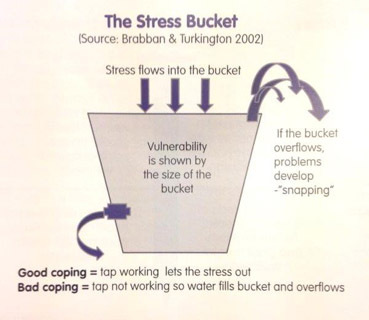
- GPs
- HPFT wellbeing service 16+ only (Accept self referrals)
- Children’s Wellbeing Practitioners (Accept self referrals)
- School Nursing Team (Accept self referrals)
- Health for Teens Website
- Young Carers in Herts
- Services for Young People (Accept self referrals)
- Childline
- Samaritans
- The Mix
- Chat Health 11-18 text messaging service
- Sandbox
- With youth
Parents Support
ANXIETY
Support for Young People experiencing Anxiety
It’s really common to develop anxiety at some point. Find out here what causes it and what you can do to feel better.
What is anxiety?
Anxiety is a normal, human feeling of fear or panic. When we face stressful situations, it can set off our brain’s in-built alarm bell system, which tells us something isn’t right and that we need to deal with it. Our brain wants the difficult situation to go away, so it makes us feel more alert, stops us thinking about other things, and even pumps more blood to our legs to help us run away.
Most of us worry sometimes – about things like friendships or money – and feel anxious when we’re under stress, like at exam time. But afterwards we usually calm down and feel better.
But when you’re not in a stressful situation, and you still feel worried or panicky, that’s when anxiety can become a problem.
Read more about anxiety here: Young Minds
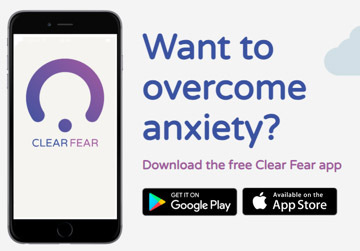
No Panic Youth Helpline: 0330 606 1174
- Service for 13-20 year olds who need help with anxiety, panics, phobias, obsessive compulsive disorder or any other anxiety related problems, available Mondays to Wednesdays 3pm – 6pm, Fridays 3pm – 6pm or Thursdays 3pm – 8pm, Saturdays 6pm – 8pm. Email support is also available sarah@nopanic.org.uk. For more information www.nopanic.org.uk
Anxiety UK – Info Line 03444 775 774
- Free and confidential service is available 9.30am - 5.30pm, Monday to Friday. It’s not a counselling service but they can point parents and young people in the direction of further help and support. There is also text support 07537 416 905 or email them support@anxietyuk.org.uk. Website has lots ofinformation and resources. www.anxietyuk.org.uk/get- help/helpline-email-text-live-chat-services/
Suggested Resources
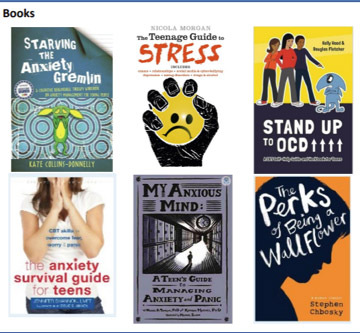
Further support
Childrens Wellbeing Practioner’s Hertfordshire
Anxiety uk guide for parents.pdf
ANGER
BEREAVEMENT
There are lots of sources of advice and support for bereavement, including:
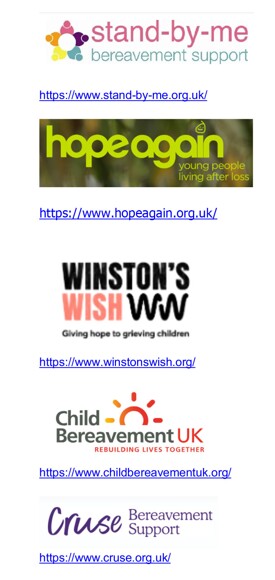
DOWN AND UNABLE TO COPE
EATING DISORDERS
https://www.youngminds.org.uk/young-person/my-feelings/eating-problems/
Beat Eating Disorders – Youthline 0808 801 0711
Youthline is a helpline for those under 18 and provides support and information about eating disorders. Helplines are open 365 days a year from 9am–8pm during the week, and 4pm– 8pm on weekends/bank holidays. A further two helplines are available; Helpline for those over 18: 0808 801 0677; Studentline (for all students): 0808 801 0811. 1:1 web chats are also available.
Emotionally Based School Avoidance
Please see the following links for support:
https://www.hct.nhs.uk/service-details-/service/childrens-wellbeing-practitioners-21/
FAMILIES
Families First (hertfordshire.gov.uk)
Family Lives – Helpline 0808 800 2222
Free confidential service for families in England and Wales for emotional support, information, advice and guidance on any aspect of parenting and family life from age 0 to teenage years (previously known as Parentline). Service is available Monday to Fridays 9am – 9pm, weekends 10am – 3pm. Online chat www.familylives/chat and email support available via askus@familylives.org.uk, as well as several online Parenting courses. For more information www.familylives.org.uk
MindEd - is a free educational resource on children and young people's mental health for all adults working with, or caring for, infants, children or teenagers. Website aims to give adults the knowledge, understanding and confidence to act on concerns about mental health. www.minded.org.uk
Families Feeling Safe
A social enterprise delivering protective behaviours training for families, via courses and workshops (many of which are free) to improve resilience and emotional wellbeing. For more information www.familiesfeelingsafe.co.uk or contact 01462 700 021 or email enquiries@familiesfeelingsafe.co.uk UPDATE all courses are now online
Families in Focus
A community Hertfordshire based interest company that provides training information and therapeutic and emotional support to parents (of children age 2- 11) and parents of special educational needs and disability children. For more information www.familiesinfocus.co.uk Or email bookings@familiesinfocus.co.uk or call 01442 219 720
Family-Action – 0808 802 6666
A free FamilyLine service that offers emotional and listening support, guidance or practical information to family members aged 18 years old and over from anywhere in England who are facing difficult situations including financial hardship, mental health problems, social isolation, learning disabilities, domestic abuse, or substance misuse and alcohol problems. Service is via telephone, text message, web chat or email. Available Monday to Friday, 9am – 9pm. Text message service: 07537 404 282, email: familyline@family- action.org.uk. Or visit website: www.family-action.org.uk/what-we-do/. There’s an out of hours service for people in crisis – leave a voice-message for a call-back service from a trained professional. Text FAMILYACTION to 85258. In addition Family-Action provides SEND support and guidance to young people and their families. For more information: www.family-action.org.uk/what-we- do/children-families/send/
Families First Hertfordshire – a portal to support all families in Hertfordshire. A Family First Assessment (FFAs) is used to identify support for families who agree to multi-agency early help. The Families First website has information on holiday schemes and support, such as advice on keeping children safe online www.hertfordshire.gov.uk/Families-First or email: familiesfirst.support@hertfordshire.gov.uk
LGBTQ+
Switchboard LGBT Helpline – 0300 330 0630
Confidential service available 10am – 10pm, every day 365 days a year. Service provides a safe space listening service via telephone, email or online chat, for lesbians, gay men, bisexual and trans people of all ages from all over UK, or anyone considering issues around their sexuality and/or gender, or any LGBT related issue including their emotional wellbeing. Service is also open to friends, parents, or any family members of LGBT who are looking for general advice and support. www.switchboard.lgbt
SELF HARM
Resources for young people
https://www.youngminds.org.uk/young-person/my-feelings/self-harm/
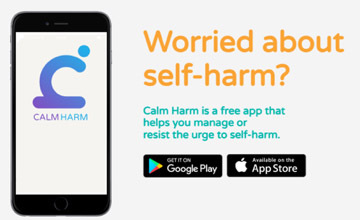
Resources for parents
https://www.youngminds.org.uk/parent/parents-a-z-mental-health-guide/self-harm/
SEND
ADD-VANCE – 07716 744 662
Hertfordshire based charity supporting families and professionals involved in the care of children affected by ADHD, Autism or a related condition. Information and resources available on website www.add-vance.org Telephone between Mondays to Fridays 9am- 1pm or email herts@add-vance.org
SPACE
Hertfordshire based charity parents/carers of children and young people on the Autistic Spectrum, with Attention Deficit Hyperactivity Disorder or a neurodiverse condition. For more information www.spaceherts.org.uk or follow them on Facebook: www.facebook.com/Spacehertfordshire
SUICIDAL FEELINGS
Suicidal Feelings | Help And Advice For Young People | YoungMinds
If you are feeling suicidal right now, know that there are people out there who can offer support and help you to get through this.
You can use the helplines listed here to get help. You can also call Childline to speak to someone about how you are feeling.
If you are at immediate risk or harm, please call 999 and ask for an ambulance.
Further Support
ChildLine – call 0800 1111
Talk to a trained counsellor for free, anytime between 7.30am till 3.30am every day. UPDATE 01/07/2021: Due to current circumstances their telephone service times have changed to: Monday to Fridays 7.30am – 3.30am, Saturday and Sundays 9am to 3.30am. You can also log in for 1-2-1 chat (the same start times as their telephone service, except their online chat closes at midnight every night) or email, although it may take them a little longer to reply back to emails. www.childline.org.uk
Papyrus - A charity dedicated to the prevention of young suicide with a specialist telephone service called HOPELINEUK, call 0800 068 41 41 or text 0778 6209697. For more information www.papyrus-uk.org
HOPELINEUK is Papyrus’s digital platform that offers support, practical advice and information to young people under the age of 35 who are experiencing thoughts of suicide, or anyone who is concerned that a young person could be thinking about suicide.
Available every day, 365 days a year, 9am – 12 midnight.
The Ollie Foundation
A charity dedicated to delivering suicide awareness, intervention and prevention training by working with the community to promote good mental health among young people and those that support them. For more information www.theolliefoundation.org or email contactus@theolliefoundation.org or phone 07715 311891
HOW TO FIND A COUNSELLOR
Tilehouse Counselling
What the service offers
Free counselling for 13- to- 19-year-olds in Hitchin and North Herts. Call 01462 440674 or email info@tilehouse.org
For more information visit https://www.tilehouse.org/
YCT
What the service offers
Free counselling, art therapy, drama therapy, group work and therapeutic support to 5- to- 25-year-olds in Hertfordshire and Essex.
For more information visit https://yctsupport.com/
Rephael House Counselling Centre
What the service offers Free counselling to 13-to- 19-year-olds in the Welwyn Hatfield area. For more information visit https://www.rephaelhouse.org.uk/
Youth Talk
What the service offers
Free counselling for 13- to- 25-year-olds in St Albans and Harpenden.
For more information, visit https://youthtalk.org.uk/
Signpost Counselling
What the service offers
Free counselling, coaching and other support to 10-to- 25-year-olds in Watford, Hemel Hempstead, Berkhamsted, Rickmansworth, South Oxhey and Borehamwood. For more information, visit https://www.signpostcounselling.org.uk/
Private counselling
Please find below links to find local private counsellors
BACP (British Association for Counselling and Psychotherapy)
Find a Therapist: Please visit the link and reconfigure your area to find a local therapist Therapists specialising in YOUNG PEOPLE within 4 miles of STEVENAGE, STEVENAGE, UK | BACP
www.counselling-directory.org.uk
www.localcounsellingcentre.co.uk (Based in Letchworth)
Online General Counselling
Online mental health support for Children and Young People
Our open access With Youth service provides online support to children and young people experiencing mental ill health and/or emotional distress.
This is a countywide service available for any Hertfordshire resident aged 5-18, as well as parents, carers and professionals.
Reach out to us today through our instant messaging service or email us at withyouth@hertfordshiremind.org with your preferred contact details.
Offers support to anyone under 25 about anything that’s troubling them. Email support available via their online contact form. Free 1-2-1 webchat service available. Free short-term counselling service available.
Phone: 0808 808 4994
Opening times: 4pm - 11pm, seven days a week
Please visit https://www.themix.org.uk/



